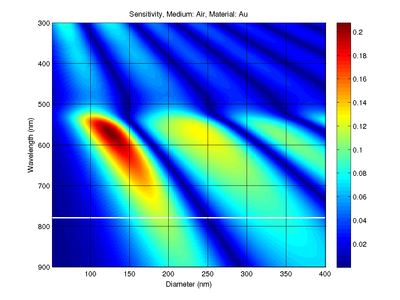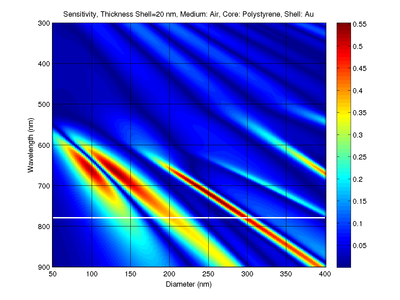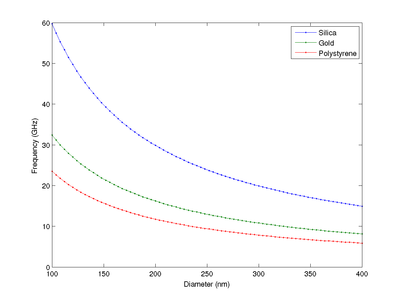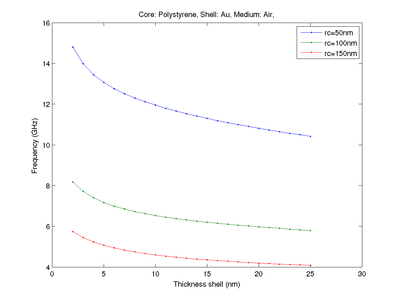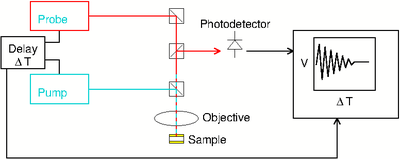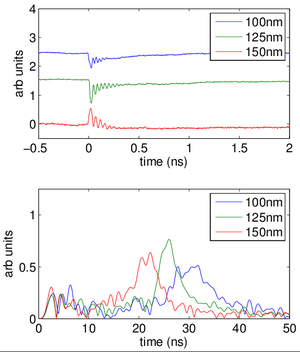Nanoparticle acoustic transducers
Contents
Introduction
There has been much interest in the optical and mechanical properties of solid and core-shell nanoparticles. Our interest stems from the ability of such devices to interact with ultrasound of very short wavelength allowing the possibility of high resolution acoustic imaging.
There are a number of different fabrication approaches that could be adopted for making nano ultrasonic transducers. Previously, a plate transducer for cell imaging has been developed, but making the lateral dimensions of the transducer smaller than one micron is challenging. An alternative approach to overcome this difficulty and to increase the frequency is to make transducers using nanoparticles.
Nanoparticle acoustic transducers have some attractions:
- Small size
- Can be made in large quantities
- Easy symmetry
- Can exploit plasmonics to enhance the detection sensitivity (for metal particles)
Optical modelling
The optical sensitivity of the transducer is governed by Mie scattering. The layer structure is designed so that the metal layer is partial reflector. Part of the probe beam incident on the transducer is transmitted into the cavity and is resonantly reflected (and transmitted) by the structure. The transducer (when it vibrates) has to show a high optical sensitivity for the probe wavelength (780 nm) in transmission or/and reflection.
The scattering and backscattering efficiencies are obtained:
where each layer is characterised by the size parameter xL=2πNrl /λ and the relative refractive index ml=nl/nm, where λ is the wavelength of the incident wave in vacuum, rl is the outer radius of the lth layer, nm and nl are the refractive index of the medium outside the particle of its lth component, respectively, and k is the propagation constant.
The optical sensitivity for a solid gold particle and a PS-Au core-shell particle in air are shown below (the white line is our probe wavelength):
Mechanical modelling
In order to make our transducers resonate at a specific frequency, the main breathing mode frequency has to be modelled based on the parameters of the transducer.
The main breathing mode for a solid silica/gold/polystyrene particle and PS-Au core-shell particle in air are shown below:
Experimental setup
The experiment is based on a dual laser asynchronous optical sampling ASOPs configuration. A simple schematic of the experimental system to test the transducers is shown below:
Results
Experimental measurements from 100, 125 and 150 nm solid gold particles on top of a glass are shown below. The signal contains a "coincidence peak" which occurs when the pump and probe pulses occur at the same time amd a thermal decay. These are removed by signal processing to leave just the oscillation corresponding to the mechanical response of the transducer. This is the main breathing mode frequency and is calculated by a FFT (fast fourier transform) of the oscillation.
Related publications
Rafael Fuentes - LU 2015 Evanston
- Technical Report - Talk, The University of Nottingham ,2015
- BibtexAuthor : Rafael Fuentes
Title : LU 2015 Evanston
In : Technical Report - Talk, The University of Nottingham -
Address :
Date : 2015
Rafael Fuentes - AFPAC 2015 Frejus
- Technical Report - Talk, The University of Nottingham ,2015
- BibtexAuthor : Rafael Fuentes
Title : AFPAC 2015 Frejus
In : Technical Report - Talk, The University of Nottingham -
Address :
Date : 2015
Rafael Fuentes, Richard Smith, Ferenado Perez-Cota, Sinead Tobin, Shilling Yan, Matt Clark - Development of nanoscale ultrasonic transducers
- Technical Report - Poster, Phonons 2015, Nottingham, UK, July 2015 ,2015
- BibtexAuthor : Rafael Fuentes, Richard Smith, Ferenado Perez-Cota, Sinead Tobin, Shilling Yan, Matt Clark
Title : Development of nanoscale ultrasonic transducers
In : Technical Report - Poster, Phonons 2015, Nottingham, UK, July 2015 -
Address :
Date : 2015
Jon Aylot, Matt Clark, Rafael Fuentes, Leonel Marques, Fernando Perez-Cota, Ovidio Pena-Rodriguez, Richard Smith, Sinead Tobin, Kevin Webb - ultrasonic imaging with sub optical wavelength elastic waves
- Technical Report - Poster, NINETEENTH SYMPOSIUM ON THERMOPHYSICAL PROPERTIES, Boulder, CO, USA June 21 - 26 ,2015
- BibtexAuthor : Jon Aylot, Matt Clark, Rafael Fuentes, Leonel Marques, Fernando Perez-Cota, Ovidio Pena-Rodriguez, Richard Smith, Sinead Tobin, Kevin Webb
Title : ultrasonic imaging with sub optical wavelength elastic waves
In : Technical Report - Poster, NINETEENTH SYMPOSIUM ON THERMOPHYSICAL PROPERTIES, Boulder, CO, USA June 21 - 26 -
Address :
Date : 2015

